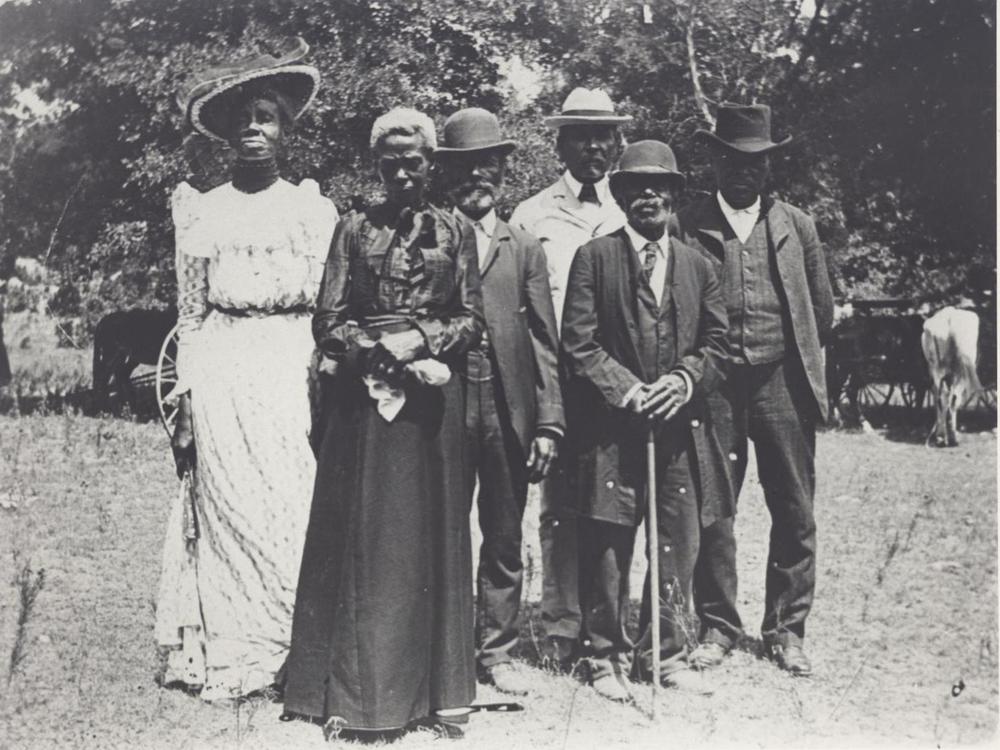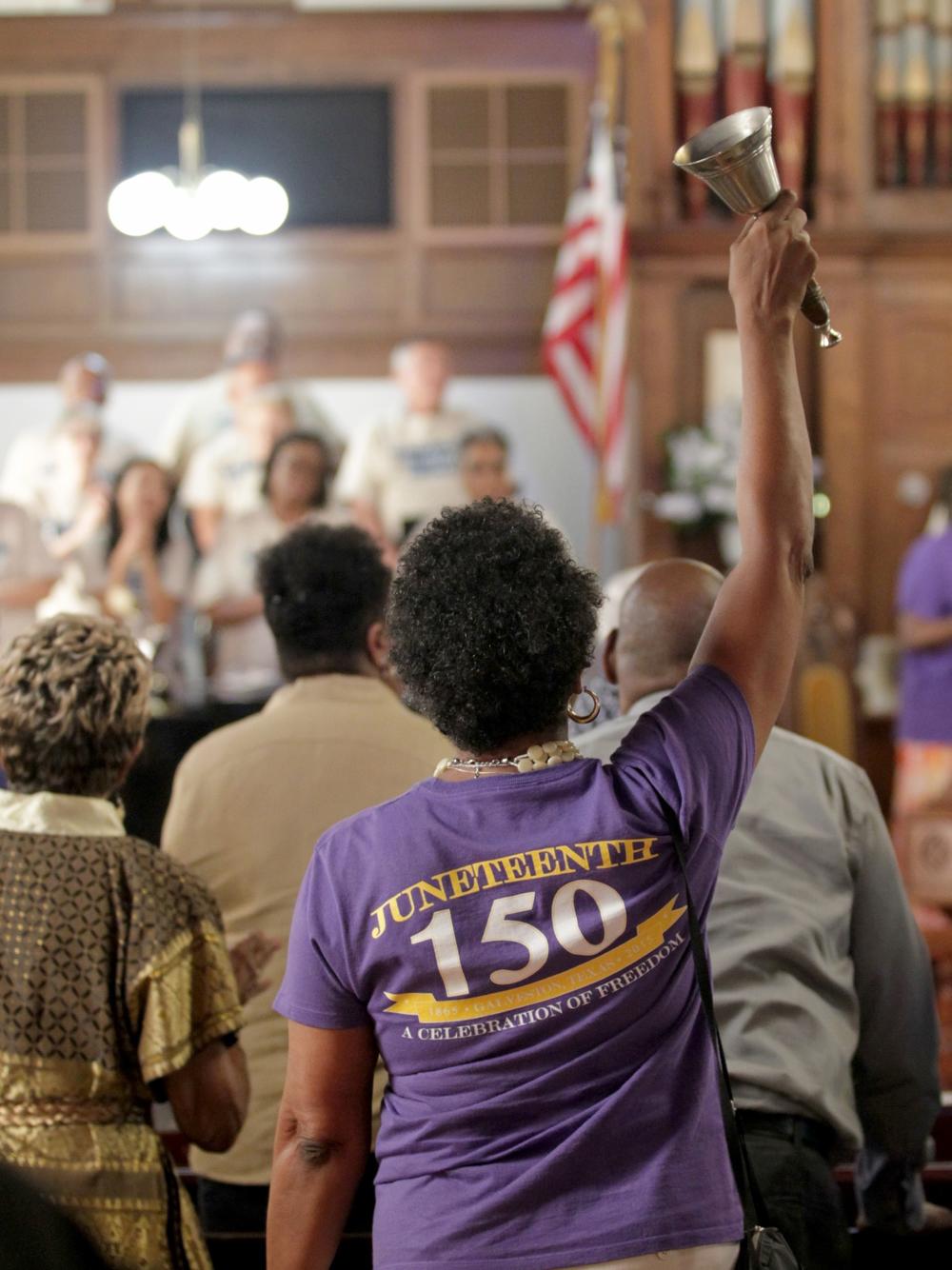Section Branding
Header Content
Juneteenth is a jubilant celebration — and a sacred lament
Primary Content
On Sunday, churchgoers will commemorate and celebrate Juneteenth during their worship services. Throughout the day there will be colorful parades, coast-to-coast music festivals, visits to historical sites, large gatherings within local communities, team sports — and plenty of barbecue.
However, many will start the day with a long-standing tradition: worship.
These lyrics, from "The Song of the Contrabands: O Let My People Go," will have a special significance at services this Sunday because they echo the spirit of the holiday. It's a biblical story about the experience of Israel — from Egyptian bondage to their exodus. The enslaved Africans identified with the story. Generations later, this hymn is still sung to remember how it felt to be a slave and to continue to seek equality and justice.
"Gospel music has been a comfort to the Black community indeed," says gospel singer Tye Tribbett, who is performing at the Juneteenth Unityfest 2022 event Sunday. "Its power to harness the ability of hope, aspiration, and faith to give courage over fear during our culture's most difficult times is part of our and the music's legacy."
In Galveston, Texas — the birthplace of Juneteenth — congregants at Reedy Chapel A.M.E. Church will begin their service at 11 a.m. and end the day with a freedom march. This was one of the locations the enslaved people heard these words, from General Order, No. 3, the original Juneteenth order, on June 19, 1865: "The people of Texas are informed that, in accordance with a proclamation from the Executive of the United States, all slaves are free."
Juneteenth is also called Jubilee Day, Emancipation Day and Freedom Day. It's the most recent new federal holiday, since Martin Luther King Jr. Day was introduced in 1983. Because it falls on "The Lord's Day," pastors will share a special message with their congregation.
Bishop T.D. Jakes of The Potter's House, in Dallas, says that in order to protect this nation's legacy, one must acknowledge and learn from the past.
"Although the origin of Juneteenth commemorations begin in Texas, it's vital we all must remember when liberty and justice is delayed or denied it causes traumatic ripples throughout future generations," he says.
Jakes adds: "As we collectively stop to acknowledge and learn from the delayed liberties of our nation's ancestors, we must not allow those same systems to repeat injustices."
In San Francisco, Grace Cathedral congregants will celebrate and lament during their service. Actress and playwright Anna Deavere Smith will deliver their morning message.
"Her deep knowledge and narrative accounts of the school-to-prison pipeline, and grounded Episcopal faith, will guide us toward the work of emancipation today. We call that End Slavery for Good, ensuring that no one be subject to slavery, even as punishment for a crime," says the Rev. Canon Anna E. Rossi.
The Rev. Joshua Lawrence Lazard, associate pastor of Church of the Covenant, a predominantly white congregation in Boston, plans to take his sermon title from James Baldwin's book, You Mean It or You Don't.
"I will remind listeners that Christians have a duty to manifest the themes of liberation and freedom," Lazard says. "Our faith requires us to be active in restoring and repairing the wrongs that stem from America's original sin of slavery."
According to historians, many American institutions played a role in justifying slavery and white supremacy — including the Christian church, which used the Bible to justify the enslavement of African Americans.
In the documentary, Juneteenth: Faith & Freedom, Christian apologist Lisa Fields says it doesn't surprise her that the first institution that the emancipated people of Galveston established legally was a church. Fields says that "they were believing God to liberate them" – not Abraham Lincoln nor their slave masters.
That brings to mind another popular hymn that could be heard on Juneteenth Sunday — "We have come this far by faith," written by Albert A. Goodson:
Further reading on this topic
White Awake: An Honest Look At What It Means To Be White, by Daniel Hill
Rediscipling The White Church: From Cheap Diversity To True Solidarity by David Swanson
The Color Of Compromise: The Truth About The American Church's Complicity In Racism, by Jemar Tisby
Be The Bridge: Pursuing God's Heart For Racial Reconciliation, by Latasha Morrison
Divided By Faith: Evangelical Religion And The Problem Of Race In America, by Michael O. Emerson & Christian Smith
"25 Black Theologians Who Have Grown Our Faith" in Christianity Today
Copyright 2022 NPR. To see more, visit https://www.npr.org.


